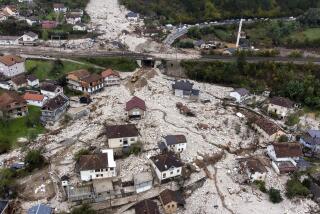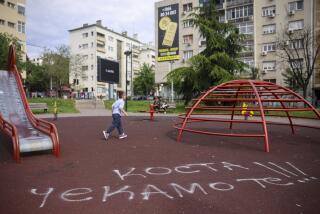Croatia Accused of Aiding Bosnia Townâs Fall
SARAJEVO, Bosnia-Herzegovina â A top official in Bosniaâs Muslim-led government accused Croatiaâs president Friday of cutting ammunition supplies to defenders of a government stronghold that has fallen to Serbian rebels.
The accusation, denied by Croatian President Franjo Tudjman, was further evidence of the crumbling Muslim-Croat front against the Serbs.
The Serbian advance sent residents fleeing the town of Jajce, 60 miles northwest of Sarajevo, and relief officials braced for the refugees.
Ejup Ganic, a Bosnian vice president, said Tudjman cut the supplies to the beleaguered defenders of Jajce, forcing them to retreat when they ran out of ammunition.
âHe is the one who is in control. He cut the supply of ammunition,â Ganic said.
Tudjman, speaking on Croatian radio, dismissed the accusations as âastonishingâ and accused âextremeâ Muslims of being responsible for Muslim-Croat feuding.
Jajce fell Thursday, according to Croatian reports. Bosniaâs army command said its troops recaptured a sector in a counterattack Friday.
The Belgrade-based Tanjug news agency reported that about 20,000 refugees from Jajce were stopped by Muslim-Croat fighting near Turbe. The town is a few miles west of Travnik, where Muslim and Croat fighters clashed last week.
The Office of the U.N. High Commissioner for Refugees sent 10 trucks with 50 tons of food and blankets to Vitez, southwest of Jajce, in anticipation of the refugeesâ arrival, spokesman Ron Redmond said in Geneva. The UNHCR was to send 14 more trucks today.
Tanjug also reported fighting between Serbs and Muslims near Zvornik, on the border with Serbia near Tuzla, the last main Muslim stronghold in eastern Bosnia.
Tuzla, where a large chemical complex is located, appears to be the Serbsâ next target. If it falls, Muslims would hold only the center of Sarajevo.
Squeezed ever tighter by brutal Serbian offensives and uncertainty over Croatian allegiance, Bosnian President Alija Izetbegovic threatened in Tehran on Friday to use poison gas to try to stop Serbian attacks.
But his outgunned armed forces appear to lack delivery systems for a poison gas strike and are not thought to have the capacity to produce anything more sophisticated than mustard gas.
More to Read
Sign up for Essential California
The most important California stories and recommendations in your inbox every morning.
You may occasionally receive promotional content from the Los Angeles Times.










